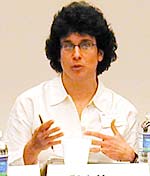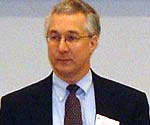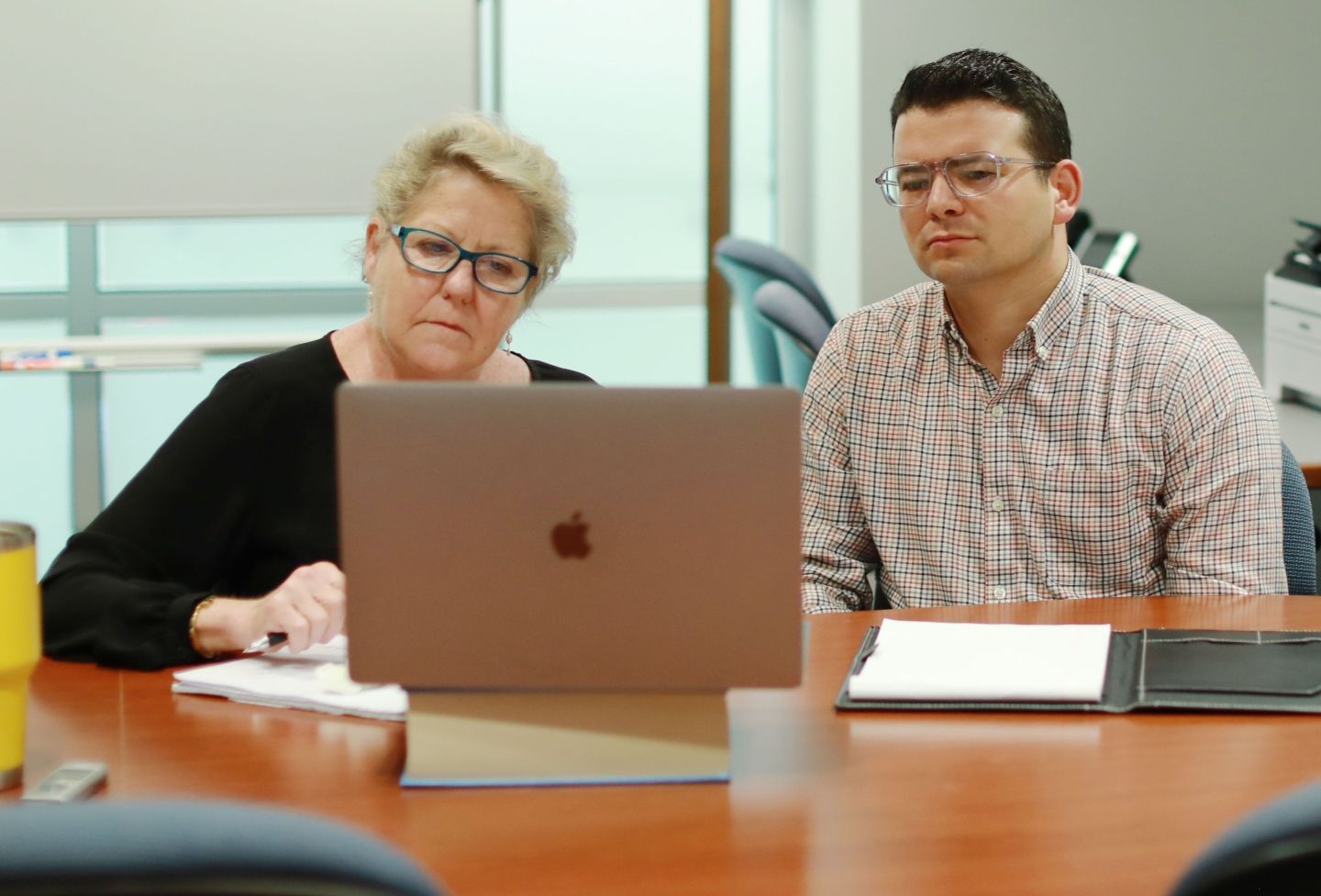Child Sex Crime Laws Evolving Due to Recent Cases





The Elizabeth Smart case and a rash of other national media-reported crimes against children have drawn attention to how law enforcement responds to child sex crimes, the focus of a Conference on Public Service and the Law panel March 15. Members of the panel — a prosecutor, two law professors, and a sex offender counselor — made clear that the law for pursuing and punishing such cases has evolved dramatically in recent decades and even over the past year as a result of the recent Catholic Church abuse scandal.
Rick Moore, Deputy Commonwealth Attorney for the City of Charlottesville, estimated that 50 percent of his cases while serving as an Augusta County prosecutor from 1986-95 were child sex crime cases.
"Child sex abuse cases are really among the worst and most tragic cases we're involved in," said Moore, who runs the Law School's Prosecution Clinic. He added that they're also among the most difficult to prosecute, for a number of reasons: you're dealing with a child witness, the case involves emotional incidents and people, there is real physical and emotional harm done, family dynamics can complicate cases because the offender is often a family member, and a "language barrier" makes it difficult to communicate and get information from children.
Sometimes parents can make the situation worse if the child did not realize what exactly was going on, and the parent appears extremely upset, further increasing the child's perceptions of the event as damaging.
"One of the things for me that made these important cases to prosecute is that child sex abuse is one of the cases that has long-term effects," Moore said.
He added that sometimes the long-term effects — poor self-image, not feeling safe — are due to something other than the offense itself, such as the offender getting away punished, or the victim carrying the weight that no one believed them. The offender may have made threats to the victim that if he or she tells, something bad will happen.
Prosecutors can help mitigate the long-term effects through punishment or penalty options, Moore said. When considering an appropriate route of punishment, prosecutors consider the nature of the crime, whether there was physical harm or force involved, whether the offender has committed similar crimes before, and the potential efficacy of counseling. Moore said if a clearly guilty offender is willing to admit the crime, prosecutors set an agreed jail time, require offender counseling, attempt to receive restitution for the family's counseling, and mandate an extended probation. If the offender denies the crime, Moore said he will try to get him as much prison time as possible.
"If a person won't admit a crime in general we think that makes them more dangerous than others." Furthermore, avoiding a trial also means the child won't be further victimized by having to take the stand. Letting offenders admit guilt publicly vindicates the child, affirming to the world that the child was right.
With new child sex crime laws on state books, SUNY-Buffalo law professor Susan Vivian Mangold said the real question is, "How far do we want to go in our legal system to protect children?"
Although the public has come a long way in acknowledging child sex crimes, the media still struggles to view them as special cases. She cited CNN coverage of the Smart case, in which commentators continually questioned whether Elizabeth Smart was a willing participant in her kidnapping, and reporting on the Alex and Derek King case, in which one AP reporter referred to Alex — 12 at the time of the murder of his father — as the "lover" of an adult friend of the family. The last incident pushed Mangold to write a letter to the editor, and she soon found a number of supportive e-mails from former child sex crime victims in her mailbox. When the first Catholic Church sex crimes were reported in 2002, it was described as a sex scandal rather than child abuse, the more recent tenor of reporting.
"They way in which our society responds to it is still very troubling," said Mangold, who has also written on the Catholic Church scandals.
Mangold said the first wave of child sex crime reforms began in the 1960s, with the publication of the Journal of American Medical Association article "Battered Child Syndrome." An education effort undertaken at hospitals after the article's publication resulted in the American Medical Association taking on the cause of establishing reporting laws. By the late 1960s, doctors were mandated to report to authorities when they reasonably suspect child abuse has occurred.
Fast-forward to 2002 — people began asking questions about why the sex crimes by clergy weren't prosecuted or even reported, said Mangold, a practicing Catholic.
"The answer is there's a big gap in the law." Following the crisis, American Catholic bishops adopted a policy of zero tolerance, she said, but later amended their decision to include an investigation, then report cases in accordance with state law. The problem, Mangold said, is there was no state law that requires these cases to be reported.
Since November 2002 several states have added clergy to their list of mandated reporters, and broadened the definition of reportable abuse to include abusers in positions of authority over children — including teachers, counselors, and clergy. New York is proposing that the mandate go back to cases as old as 20 years.
Imposing this much wider net will likely have consequences and raise questions, Mangold said, in particular now that some state laws require reporting alleged abuse to law enforcement rather than Child Protective Services or even parents.
Punishment options, from Megan's Law, which requires registration of known sex offenders, to counseling, have also been under increased scrutiny. Valerie Brickell, the assistant director of the Sexual Offender Residential Treatment Program (SORT) at the Brunswick Correctional Center in Lawrenceville, Va., said she treats inmates who are at risk for re-offending. Brickell surprised the audience when she noted that sex offenders are actually at a lower risk of recidivism that other offenders — estimates run from 4 to 30 percent. A select few offenders skew the numbers, since many never re-offend, she said. The recidivism rate is so low that it's difficult to show through scientific means that treatment helps because of the ethics involved in crafting effective studies.
"Right now it does seem to be that treatment can be effective," she said.
Brickell said the offenders in her program come from every walk of life. "Because of that sometimes victims aren't believed," and that further reinforces offenders' denial. In the SORT program, offenders receive treatment for two to three years; Brickell noted that giving sex convicts treatment also protects the prison system from offenders' lawsuits for not offering treatment.
Brickell said treatment focuses on getting offenders to recognize what caused the offense to happen, and "what is it they're telling themselves to make it ok to offend." They often excuse their behavior by saying, "she was coming on to me, acting sexy" — and the victim could be six years old. Brickell said they work to change these kinds of cognitive distortions.
Brickell cautioned the future lawyers in the audience to take a counselor's "clinical judgment" with a grain of salt. She said just because a counselor thinks an offender is doing well doesn't mean they are. Sometimes the argumentative offenders are actually making more progress than those who appear more conciliatory. As a result, it's important to back up clinical judgments with outside data such as polygraphs.
"If they can manipulate a child, they can manipulate you," she said.
DePaul University associate law professor Michele Goodwin's research focuses on an area of sex crimes that "tends to be overlooked": juvenile sexual offenders and sexual harassment in public school settings.
She pointed to the case of LaShonda Davis, which eventually went to the Supreme Court as Davis v. Monroe County Board of Education. Davis, a fifth-grader, was repeatedly harassed by a male classmate who rubbed up against her and touched her breasts. When Davis's mother asked the school to deal with the situation, the principal, according to Goodwin, said "boys will be boys" and over months of such incidents failed to act. Davis's mother finally turned to law enforcement, filing criminal charges against the boy. The Court found that the school could be held liable for their indifference to pervasive sexual harassment.
Goodwin suggested that there could be other ways to deal with the boy's behavior before it turned into a criminal case. One "unfair" response to the ruling might be that schools start calling police instead of counselors. In her research, she found that police were called for harassment by black boys most. Calling the police may not be the best solution she suggested, since more aggressive cases "probably have a lot to do with the kids being victimized themselves.
"I don't think the criminal justice system should necessarily be the answer for some of these kids."
Goodwin said counseling is a viable option — in one case she observed parents of the victim and offender, along with the two children, were all brought into a room to talk about how they felt. The victim was able to face the offender and explain the pain caused by his actions.
After panel members spoke the floor was opened to questions. One attendee questioned the panel about the fairness of Megan's Law, the federal version of which sets minimum requirements for states to keep registries of known, convicted sex offenders and for that information to be open to the public. Some states, like New Jersey, where the law started, actively notify communities that sex offenders have moved into, but regulations vary from state to state. Brickell noted that the laws can make it harder for ex-convicts to find jobs, or even a place to live, if the state has laws prohibiting living within a certain distance from a school, making it harder to adapt back into society. Mangold called the laws "reactions to egregious cases.
"You learn in school that tough cases make bad law," she said.
Moore said a number of offenders affected by Megan's Law are probably not going to re-offend. He suggested letting prosecutors decide who needs to register. He said he would nominate only a quarter or a fifth of the cases he's prosecuted for the list.
Goodwin added, "The spring of Megan's law were more in some ways to protect the parents," to make them feel their children were safe. She said the laws could create a false sense of comfort since the abuser is often a family member or trusted neighbor, not a convicted sex offender.
Founded in 1819, the University of Virginia School of Law is the second-oldest continuously operating law school in the nation. Consistently ranked among the top law schools, Virginia is a world-renowned training ground for distinguished lawyers and public servants, instilling in them a commitment to leadership, integrity and community service.


